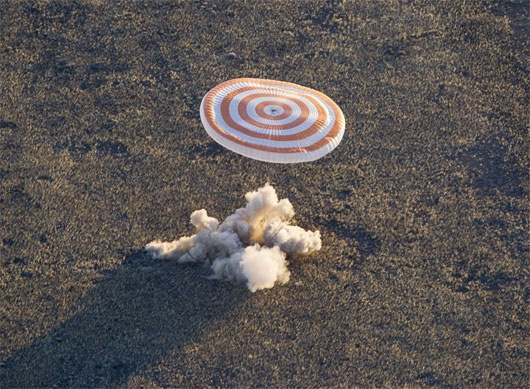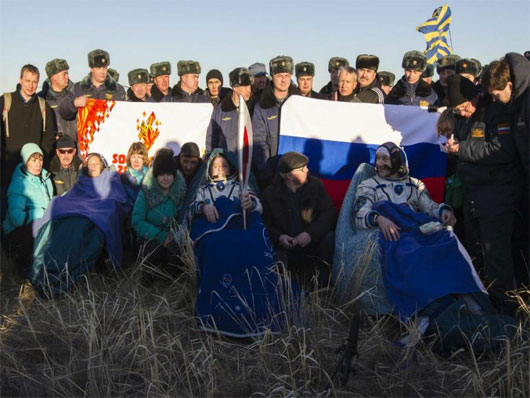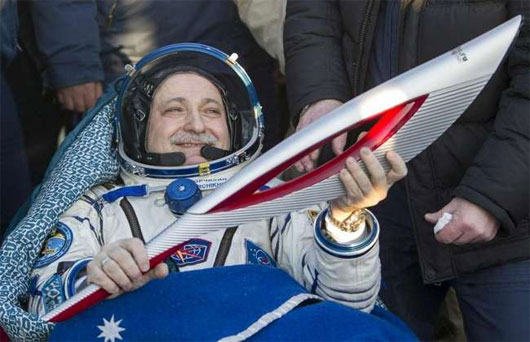The Soyuz spacecraft returned safely to the Olympic torch
Russia's Soyuz spacecraft on 11 November brought three astronauts back after a mission lasting 166 days, and carrying the 2014 Sochi Winter Olympic torch back to earth from the International Space Station (ISS) after a walk in the historical space.
>>>Walking torch relay in space

Soyuz TMA-09M returns safely in Kazakhstan - (Photo: AFP)
The Soyuz TMA-09M carries three astronauts including Fyodor Yurchikhin (of the Russian Federal Space Agency - Roscosmos), Karen Nyberg (US Space and Aeronautics Agency - NASA) and Luca Parmitano (European Space Agency) Europe - ESA) landed in the prairies of Kazakhstan at 9:49 am 11/11 (VN time).
According to AFP, the Olympic torch, which was not lit in its space travel journey due to the prevention of incidents on ISS and the lack of oxygen in space, was safely taken and Roscosmos's staff was taken out. how
Previously, this torch was sent by Soyuz TMA-11M to ISS during a six-hour "express" flight on November 7. And then two days later, it was taken out into space in the iconic walk, first performed in history.

Three Soyuz TMA-09M astronauts are Karen Nyberg (left), Fyodor Yurchikhin (middle) and Luca Parmitano - (Photo: AFP)

Astronaut Fyodor Yurchikhin with the Sochi Olympic torch (February 7-23, 2014 in Russia) - (Photo: AFP)
According to the announcement of Roscosmos, Soyuz TMA-09M's return flight is safe and 3 astronauts are in good condition.
With the return of Soyuz TMA-09M, there are 6 astronauts left on the ISS, in addition to the 3 members of Soyuz TMA-11M, Koichi Wakata (Japanese Space Exploration Agency) Version - JAXA, Mikhail Tyurin (Roscosmos) and Rick Mastracchio (NASA), there are 3 Soyuz TMA-10M ships posted at the end of September, including Oleg Kotov, Sergey Ryazansky (Roscosmos) and Mike Hopkins (NASA) .
- Russian spacecraft to ISS carries Olympic torch
- The Sochi Olympic torch is about to fly to space
- Russia 'plays' the Olympic torch on the universe
- Russia's Soyuz spacecraft returned to Earth
- Video: Olympic torch is put into space
- Walking torch relay in space
- Three astronauts returned to Earth safely after nearly 6 months on ISS
- The three astronauts returned to Earth safely on the hole in the ship
- The Soyuz spacecraft brought three astronauts back to Earth
- The Soyuz and the crew returned to Earth safely
- The mysterious spacecraft X-37B has returned to Earth
- Malaysia's first astronaut returned to earth
 Van Allen's belt and evidence that the Apollo 11 mission to the Moon was myth
Van Allen's belt and evidence that the Apollo 11 mission to the Moon was myth The levels of civilization in the universe (Kardashev scale)
The levels of civilization in the universe (Kardashev scale) Today Mars, the sun and the Earth are aligned
Today Mars, the sun and the Earth are aligned The Amazon owner announced a secret plan to build a space base for thousands of people
The Amazon owner announced a secret plan to build a space base for thousands of people 'Strange smell' detected on cargo spacecraft to ISS
'Strange smell' detected on cargo spacecraft to ISS  After 4 years of being sent into space by Elon Musk, what is the fate of the $100,000 Tesla Roadster now?
After 4 years of being sent into space by Elon Musk, what is the fate of the $100,000 Tesla Roadster now?  The Shape of the Universe Isn't What You Think: From Ancient Round Sky to Modern Three-Dimensional Donut
The Shape of the Universe Isn't What You Think: From Ancient Round Sky to Modern Three-Dimensional Donut  How to get back to the spacecraft if the astronauts leave the cabin to work and accidentally drift away?
How to get back to the spacecraft if the astronauts leave the cabin to work and accidentally drift away?  Announcement of discovery of micro-asteroid population in the Solar System
Announcement of discovery of micro-asteroid population in the Solar System  Solving 'traffic jams' in space
Solving 'traffic jams' in space 